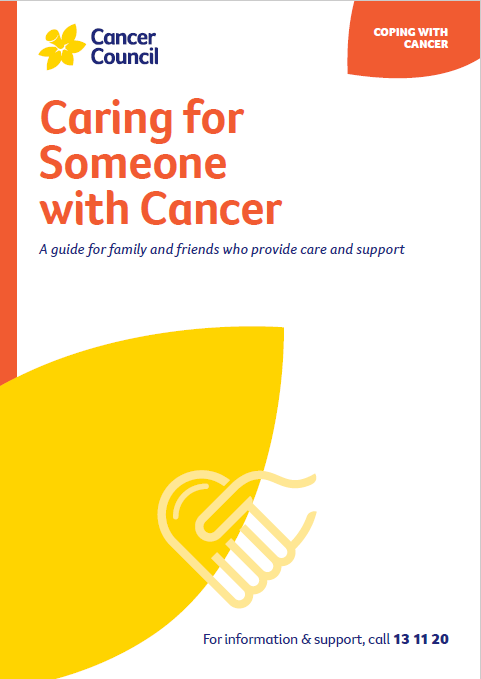- Home
- About Cancer
- Supporting someone with cancer
- Caring for someone with cancer
- Your role as a carer
- Providing medical care
- Monitoring symptoms and side effects
Monitoring symptoms and side effects
Cancer itself can cause a range of symptoms, and cancer treatments often cause side effects. Some common symptoms and side effects include pain; fatigue; breathlessness; nausea and loss of appetite.
Carers often help the person they are caring for manage these issues. You can also call Cancer Council 13 11 20 to find out more about these and other common side effects experienced by people with cancer.
Learn more about:
- How long side effects last
- Late side effects
- When to see a doctor
- Managing common symptoms and side effects
How long side effects last
Some side effects go away quickly; others can take weeks, months or even years to improve. Some side effects may be permanent.
A person’s body will cope with the treatment and recovery in its own way. It is important not to compare the person you are caring for to others. It’s also important to let the treatment team know about any symptoms or side effects – they will often be able to suggest medicines and other treatments that may help.
Late side effects
These are problems that develop months or years after treatment finishes. Talk to the person’s doctor about whether they are at risk of developing late side effects from treatment and the symptoms to watch out for. Ask the treatment team for a survivorship care plan to help guide you both through follow-up care.
For more on this, see Living well after cancer.
Some cancer treatments increase the risk of getting an infection. If the person you are caring for has low immunity, you may need to ask family and friends with a cold, COVID-19, the flu or other contagious infections not to visit while they have symptoms.
When to see a doctor
The treatment team will let you both know of any side effects that need to be closely monitored and when to contact them.
Issues that require urgent medical attention include:
- a temperature of 38°C or above
- chest pain or breathlessness
- severe nausea or vomiting that lasts more than a few hours
- redness or swelling around the site of an injection or wound
- confusion
- severe headache with a stiff neck
- chills with shaking or shivering
- severe abdominal (belly) pain, constipation or diarrhoea
- unusual bleeding or bruising, such as heavy nosebleeds, blood in the urine (wee) or black faeces (poo)
- not being able to control the bladder (incontinence) or having trouble passing urine and/or leg weakness
- burning or stinging feeling when urinating (weeing)
- rash or skin lesions
- any serious unexpected side effects or if the person suddenly gets a lot sicker.
Cancer Council videos and podcasts for carers
Video series
Watch Australian Carers Talk to see carers and health professionals share experiences and provide practical tips.
Podcast series
Listen with a podcast app or at cancercouncil.com.au/podcasts:
- The Thing About Cancer – for tips on managing treatment side effects and insights on being a carer.
- The Thing About Advanced Cancer – for information about caring for someone in their last months of life.
- Finding Calm During Cancer – for a series of meditation and relaxation exercises.
→ READ MORE: Managing common symptoms and side effects
Podcast: How to Help Someone with Cancer
Listen to more of our podcast for people affected by cancer
Dr Alison White, Palliative Medicine Specialist, Royal Perth Hospital, WA; Tracey Bilson, Consumer; Louise Dillon, Consumer; Louise Durham, Nurse Practitioner, Palliative Care Outpatients, Princess Alexandra Hospital, QLD; Katrina Elias, Carers Program, South Western Sydney Local Health District, NSW Health, NSW; Jessica Elliott, Social Worker, Youth Cancer Services, Crown Princess Mary Cancer Centre, Westmead Hospital, NSW; Brendan Myhill, Social Worker and Bereavement Research Officer, Concord Repatriation General Hospital, NSW; Penny Neller, Project Coordinator, National Palliative Care Projects, Australian Centre for Health Law Research, Queensland University of Technology, QLD; Olivia Palac, Acting Assistant Director, Occupational Therapy, Gold Coast University Hospital, QLD; Nicole Rampton, Advanced Occupational Therapist, Cancer Services, Gold Coast University Hospital, QLD; Shirley Roberts, Nurse Consultant, Medical Oncology, Northern Adelaide Cancer Centre, SA; Dr Elysia Thornton-Benko, Specialist General Practitioner, and UNSW Research Fellow, NSW; Kathleen Wilkins, Consumer; Helen Zahra, Carers Program, South Western Sydney Local Health District, NSW Health, NSW.
View the Cancer Council NSW editorial policy.
View all publications or call 13 11 20 for free printed copies.
